Psychology Research: Ethical Principles, Factors, and Prejudice
VerifiedAdded on 2020/10/23
|10
|2772
|154
Report
AI Summary
This psychology research report delves into various aspects of human behavior and psychological principles. It begins by outlining three key ethical principles – conformity, obedience, and prosocial behavior – and their significance in psychological research. The report then explores factors influencing an individual's self-concept, including the impact of education, identity, abuse, and relationships. Furthermore, it discusses prejudice, stereotypes, and discrimination, examining their relationships and effects. Finally, the report analyzes factors that impede groups from making sound decisions, providing a comprehensive overview of these critical psychological concepts.

Research in Psychology
Paraphrase This Document
Need a fresh take? Get an instant paraphrase of this document with our AI Paraphraser
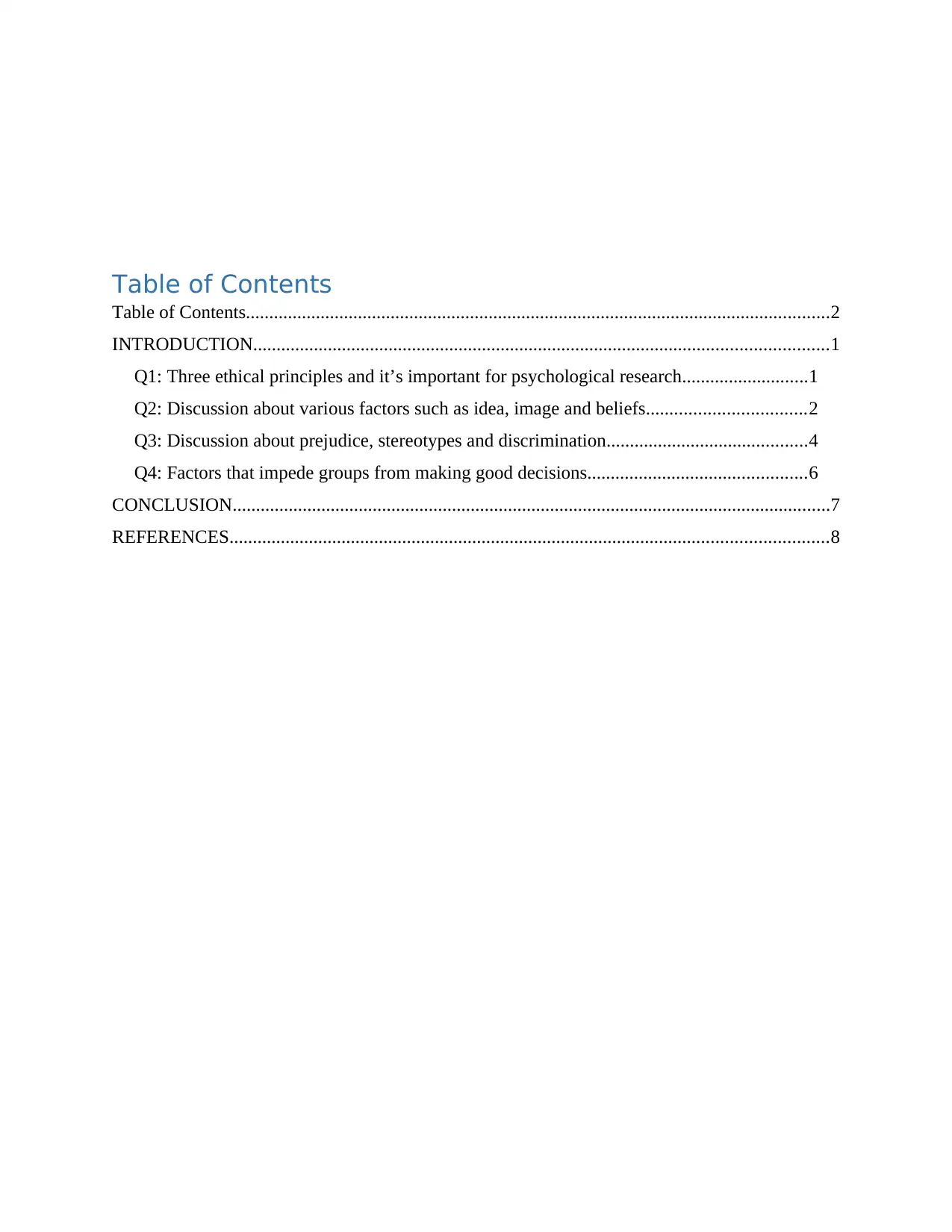
Table of Contents
Table of Contents.............................................................................................................................2
INTRODUCTION...........................................................................................................................1
Q1: Three ethical principles and it’s important for psychological research...........................1
Q2: Discussion about various factors such as idea, image and beliefs..................................2
Q3: Discussion about prejudice, stereotypes and discrimination...........................................4
Q4: Factors that impede groups from making good decisions...............................................6
CONCLUSION................................................................................................................................7
REFERENCES................................................................................................................................8
Table of Contents.............................................................................................................................2
INTRODUCTION...........................................................................................................................1
Q1: Three ethical principles and it’s important for psychological research...........................1
Q2: Discussion about various factors such as idea, image and beliefs..................................2
Q3: Discussion about prejudice, stereotypes and discrimination...........................................4
Q4: Factors that impede groups from making good decisions...............................................6
CONCLUSION................................................................................................................................7
REFERENCES................................................................................................................................8
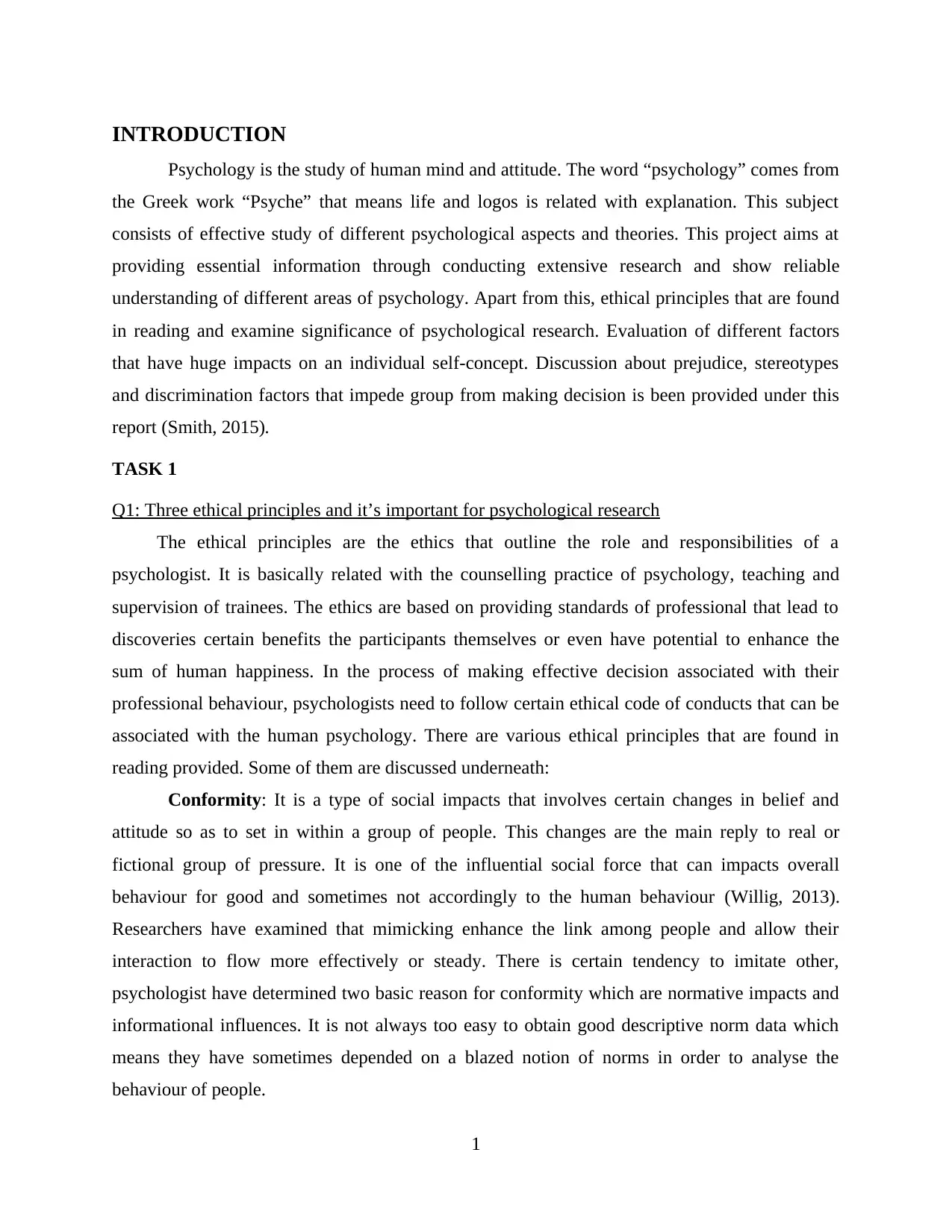
INTRODUCTION
Psychology is the study of human mind and attitude. The word “psychology” comes from
the Greek work “Psyche” that means life and logos is related with explanation. This subject
consists of effective study of different psychological aspects and theories. This project aims at
providing essential information through conducting extensive research and show reliable
understanding of different areas of psychology. Apart from this, ethical principles that are found
in reading and examine significance of psychological research. Evaluation of different factors
that have huge impacts on an individual self-concept. Discussion about prejudice, stereotypes
and discrimination factors that impede group from making decision is been provided under this
report (Smith, 2015).
TASK 1
Q1: Three ethical principles and it’s important for psychological research
The ethical principles are the ethics that outline the role and responsibilities of a
psychologist. It is basically related with the counselling practice of psychology, teaching and
supervision of trainees. The ethics are based on providing standards of professional that lead to
discoveries certain benefits the participants themselves or even have potential to enhance the
sum of human happiness. In the process of making effective decision associated with their
professional behaviour, psychologists need to follow certain ethical code of conducts that can be
associated with the human psychology. There are various ethical principles that are found in
reading provided. Some of them are discussed underneath:
Conformity: It is a type of social impacts that involves certain changes in belief and
attitude so as to set in within a group of people. This changes are the main reply to real or
fictional group of pressure. It is one of the influential social force that can impacts overall
behaviour for good and sometimes not accordingly to the human behaviour (Willig, 2013).
Researchers have examined that mimicking enhance the link among people and allow their
interaction to flow more effectively or steady. There is certain tendency to imitate other,
psychologist have determined two basic reason for conformity which are normative impacts and
informational influences. It is not always too easy to obtain good descriptive norm data which
means they have sometimes depended on a blazed notion of norms in order to analyse the
behaviour of people.
1
Psychology is the study of human mind and attitude. The word “psychology” comes from
the Greek work “Psyche” that means life and logos is related with explanation. This subject
consists of effective study of different psychological aspects and theories. This project aims at
providing essential information through conducting extensive research and show reliable
understanding of different areas of psychology. Apart from this, ethical principles that are found
in reading and examine significance of psychological research. Evaluation of different factors
that have huge impacts on an individual self-concept. Discussion about prejudice, stereotypes
and discrimination factors that impede group from making decision is been provided under this
report (Smith, 2015).
TASK 1
Q1: Three ethical principles and it’s important for psychological research
The ethical principles are the ethics that outline the role and responsibilities of a
psychologist. It is basically related with the counselling practice of psychology, teaching and
supervision of trainees. The ethics are based on providing standards of professional that lead to
discoveries certain benefits the participants themselves or even have potential to enhance the
sum of human happiness. In the process of making effective decision associated with their
professional behaviour, psychologists need to follow certain ethical code of conducts that can be
associated with the human psychology. There are various ethical principles that are found in
reading provided. Some of them are discussed underneath:
Conformity: It is a type of social impacts that involves certain changes in belief and
attitude so as to set in within a group of people. This changes are the main reply to real or
fictional group of pressure. It is one of the influential social force that can impacts overall
behaviour for good and sometimes not accordingly to the human behaviour (Willig, 2013).
Researchers have examined that mimicking enhance the link among people and allow their
interaction to flow more effectively or steady. There is certain tendency to imitate other,
psychologist have determined two basic reason for conformity which are normative impacts and
informational influences. It is not always too easy to obtain good descriptive norm data which
means they have sometimes depended on a blazed notion of norms in order to analyse the
behaviour of people.
1
⊘ This is a preview!⊘
Do you want full access?
Subscribe today to unlock all pages.

Trusted by 1+ million students worldwide
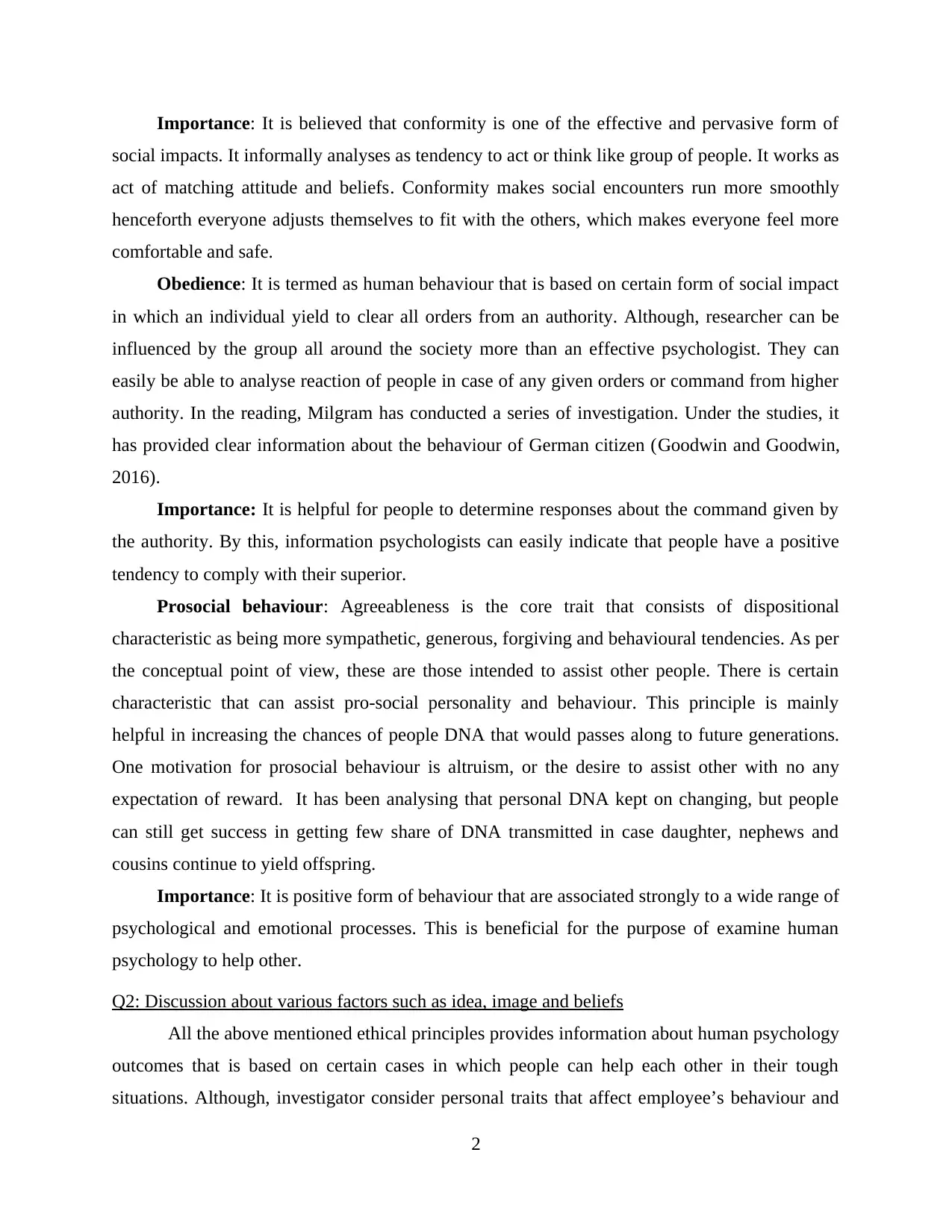
Importance: It is believed that conformity is one of the effective and pervasive form of
social impacts. It informally analyses as tendency to act or think like group of people. It works as
act of matching attitude and beliefs. Conformity makes social encounters run more smoothly
henceforth everyone adjusts themselves to fit with the others, which makes everyone feel more
comfortable and safe.
Obedience: It is termed as human behaviour that is based on certain form of social impact
in which an individual yield to clear all orders from an authority. Although, researcher can be
influenced by the group all around the society more than an effective psychologist. They can
easily be able to analyse reaction of people in case of any given orders or command from higher
authority. In the reading, Milgram has conducted a series of investigation. Under the studies, it
has provided clear information about the behaviour of German citizen (Goodwin and Goodwin,
2016).
Importance: It is helpful for people to determine responses about the command given by
the authority. By this, information psychologists can easily indicate that people have a positive
tendency to comply with their superior.
Prosocial behaviour: Agreeableness is the core trait that consists of dispositional
characteristic as being more sympathetic, generous, forgiving and behavioural tendencies. As per
the conceptual point of view, these are those intended to assist other people. There is certain
characteristic that can assist pro-social personality and behaviour. This principle is mainly
helpful in increasing the chances of people DNA that would passes along to future generations.
One motivation for prosocial behaviour is altruism, or the desire to assist other with no any
expectation of reward. It has been analysing that personal DNA kept on changing, but people
can still get success in getting few share of DNA transmitted in case daughter, nephews and
cousins continue to yield offspring.
Importance: It is positive form of behaviour that are associated strongly to a wide range of
psychological and emotional processes. This is beneficial for the purpose of examine human
psychology to help other.
Q2: Discussion about various factors such as idea, image and beliefs
All the above mentioned ethical principles provides information about human psychology
outcomes that is based on certain cases in which people can help each other in their tough
situations. Although, investigator consider personal traits that affect employee’s behaviour and
2
social impacts. It informally analyses as tendency to act or think like group of people. It works as
act of matching attitude and beliefs. Conformity makes social encounters run more smoothly
henceforth everyone adjusts themselves to fit with the others, which makes everyone feel more
comfortable and safe.
Obedience: It is termed as human behaviour that is based on certain form of social impact
in which an individual yield to clear all orders from an authority. Although, researcher can be
influenced by the group all around the society more than an effective psychologist. They can
easily be able to analyse reaction of people in case of any given orders or command from higher
authority. In the reading, Milgram has conducted a series of investigation. Under the studies, it
has provided clear information about the behaviour of German citizen (Goodwin and Goodwin,
2016).
Importance: It is helpful for people to determine responses about the command given by
the authority. By this, information psychologists can easily indicate that people have a positive
tendency to comply with their superior.
Prosocial behaviour: Agreeableness is the core trait that consists of dispositional
characteristic as being more sympathetic, generous, forgiving and behavioural tendencies. As per
the conceptual point of view, these are those intended to assist other people. There is certain
characteristic that can assist pro-social personality and behaviour. This principle is mainly
helpful in increasing the chances of people DNA that would passes along to future generations.
One motivation for prosocial behaviour is altruism, or the desire to assist other with no any
expectation of reward. It has been analysing that personal DNA kept on changing, but people
can still get success in getting few share of DNA transmitted in case daughter, nephews and
cousins continue to yield offspring.
Importance: It is positive form of behaviour that are associated strongly to a wide range of
psychological and emotional processes. This is beneficial for the purpose of examine human
psychology to help other.
Q2: Discussion about various factors such as idea, image and beliefs
All the above mentioned ethical principles provides information about human psychology
outcomes that is based on certain cases in which people can help each other in their tough
situations. Although, investigator consider personal traits that affect employee’s behaviour and
2
Paraphrase This Document
Need a fresh take? Get an instant paraphrase of this document with our AI Paraphraser
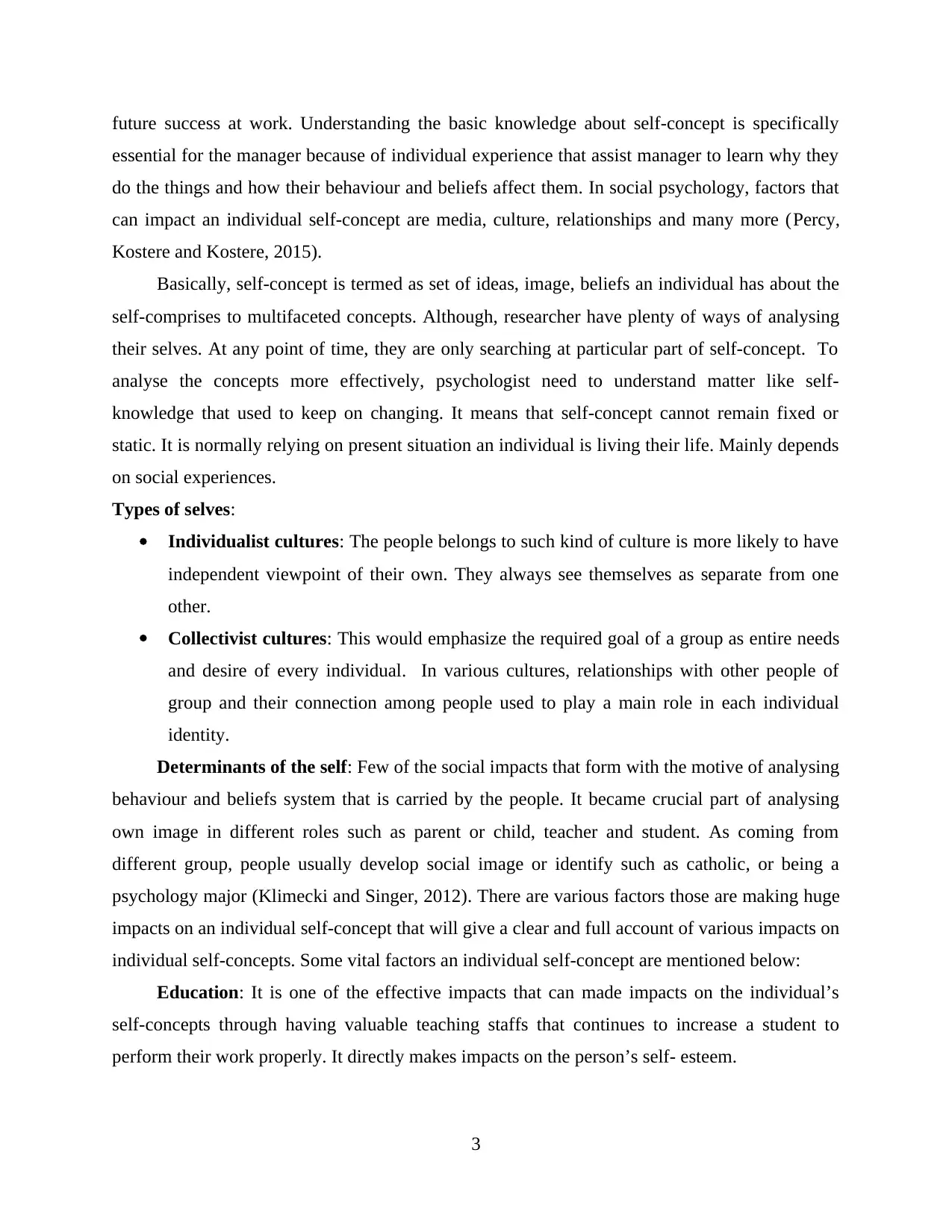
future success at work. Understanding the basic knowledge about self-concept is specifically
essential for the manager because of individual experience that assist manager to learn why they
do the things and how their behaviour and beliefs affect them. In social psychology, factors that
can impact an individual self-concept are media, culture, relationships and many more (Percy,
Kostere and Kostere, 2015).
Basically, self-concept is termed as set of ideas, image, beliefs an individual has about the
self-comprises to multifaceted concepts. Although, researcher have plenty of ways of analysing
their selves. At any point of time, they are only searching at particular part of self-concept. To
analyse the concepts more effectively, psychologist need to understand matter like self-
knowledge that used to keep on changing. It means that self-concept cannot remain fixed or
static. It is normally relying on present situation an individual is living their life. Mainly depends
on social experiences.
Types of selves:
Individualist cultures: The people belongs to such kind of culture is more likely to have
independent viewpoint of their own. They always see themselves as separate from one
other.
Collectivist cultures: This would emphasize the required goal of a group as entire needs
and desire of every individual. In various cultures, relationships with other people of
group and their connection among people used to play a main role in each individual
identity.
Determinants of the self: Few of the social impacts that form with the motive of analysing
behaviour and beliefs system that is carried by the people. It became crucial part of analysing
own image in different roles such as parent or child, teacher and student. As coming from
different group, people usually develop social image or identify such as catholic, or being a
psychology major (Klimecki and Singer, 2012). There are various factors those are making huge
impacts on an individual self-concept that will give a clear and full account of various impacts on
individual self-concepts. Some vital factors an individual self-concept are mentioned below:
Education: It is one of the effective impacts that can made impacts on the individual’s
self-concepts through having valuable teaching staffs that continues to increase a student to
perform their work properly. It directly makes impacts on the person’s self- esteem.
3
essential for the manager because of individual experience that assist manager to learn why they
do the things and how their behaviour and beliefs affect them. In social psychology, factors that
can impact an individual self-concept are media, culture, relationships and many more (Percy,
Kostere and Kostere, 2015).
Basically, self-concept is termed as set of ideas, image, beliefs an individual has about the
self-comprises to multifaceted concepts. Although, researcher have plenty of ways of analysing
their selves. At any point of time, they are only searching at particular part of self-concept. To
analyse the concepts more effectively, psychologist need to understand matter like self-
knowledge that used to keep on changing. It means that self-concept cannot remain fixed or
static. It is normally relying on present situation an individual is living their life. Mainly depends
on social experiences.
Types of selves:
Individualist cultures: The people belongs to such kind of culture is more likely to have
independent viewpoint of their own. They always see themselves as separate from one
other.
Collectivist cultures: This would emphasize the required goal of a group as entire needs
and desire of every individual. In various cultures, relationships with other people of
group and their connection among people used to play a main role in each individual
identity.
Determinants of the self: Few of the social impacts that form with the motive of analysing
behaviour and beliefs system that is carried by the people. It became crucial part of analysing
own image in different roles such as parent or child, teacher and student. As coming from
different group, people usually develop social image or identify such as catholic, or being a
psychology major (Klimecki and Singer, 2012). There are various factors those are making huge
impacts on an individual self-concept that will give a clear and full account of various impacts on
individual self-concepts. Some vital factors an individual self-concept are mentioned below:
Education: It is one of the effective impacts that can made impacts on the individual’s
self-concepts through having valuable teaching staffs that continues to increase a student to
perform their work properly. It directly makes impacts on the person’s self- esteem.
3
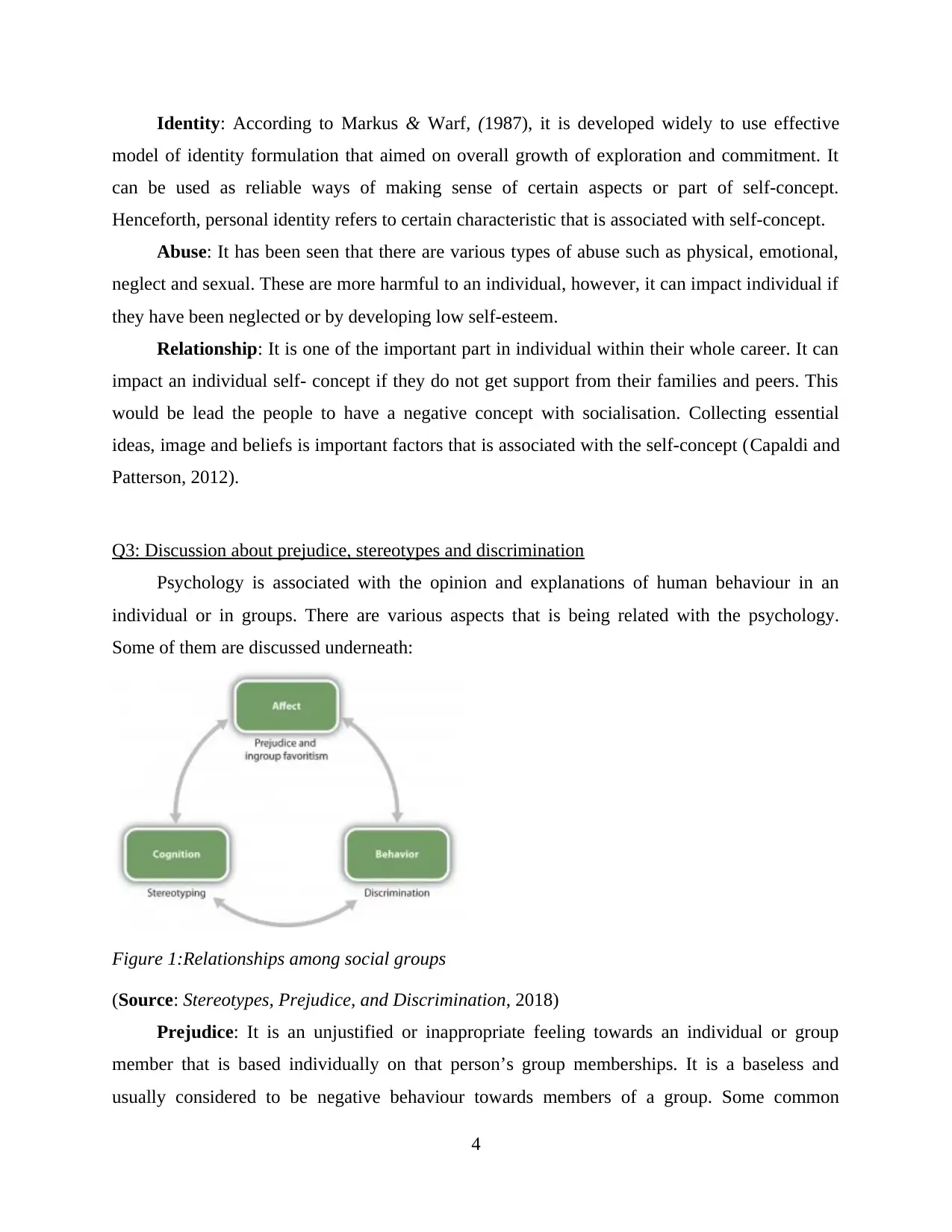
Identity: According to Markus & Warf, (1987), it is developed widely to use effective
model of identity formulation that aimed on overall growth of exploration and commitment. It
can be used as reliable ways of making sense of certain aspects or part of self-concept.
Henceforth, personal identity refers to certain characteristic that is associated with self-concept.
Abuse: It has been seen that there are various types of abuse such as physical, emotional,
neglect and sexual. These are more harmful to an individual, however, it can impact individual if
they have been neglected or by developing low self-esteem.
Relationship: It is one of the important part in individual within their whole career. It can
impact an individual self- concept if they do not get support from their families and peers. This
would be lead the people to have a negative concept with socialisation. Collecting essential
ideas, image and beliefs is important factors that is associated with the self-concept (Capaldi and
Patterson, 2012).
Q3: Discussion about prejudice, stereotypes and discrimination
Psychology is associated with the opinion and explanations of human behaviour in an
individual or in groups. There are various aspects that is being related with the psychology.
Some of them are discussed underneath:
Figure 1:Relationships among social groups
(Source: Stereotypes, Prejudice, and Discrimination, 2018)
Prejudice: It is an unjustified or inappropriate feeling towards an individual or group
member that is based individually on that person’s group memberships. It is a baseless and
usually considered to be negative behaviour towards members of a group. Some common
4
model of identity formulation that aimed on overall growth of exploration and commitment. It
can be used as reliable ways of making sense of certain aspects or part of self-concept.
Henceforth, personal identity refers to certain characteristic that is associated with self-concept.
Abuse: It has been seen that there are various types of abuse such as physical, emotional,
neglect and sexual. These are more harmful to an individual, however, it can impact individual if
they have been neglected or by developing low self-esteem.
Relationship: It is one of the important part in individual within their whole career. It can
impact an individual self- concept if they do not get support from their families and peers. This
would be lead the people to have a negative concept with socialisation. Collecting essential
ideas, image and beliefs is important factors that is associated with the self-concept (Capaldi and
Patterson, 2012).
Q3: Discussion about prejudice, stereotypes and discrimination
Psychology is associated with the opinion and explanations of human behaviour in an
individual or in groups. There are various aspects that is being related with the psychology.
Some of them are discussed underneath:
Figure 1:Relationships among social groups
(Source: Stereotypes, Prejudice, and Discrimination, 2018)
Prejudice: It is an unjustified or inappropriate feeling towards an individual or group
member that is based individually on that person’s group memberships. It is a baseless and
usually considered to be negative behaviour towards members of a group. Some common
4
⊘ This is a preview!⊘
Do you want full access?
Subscribe today to unlock all pages.

Trusted by 1+ million students worldwide
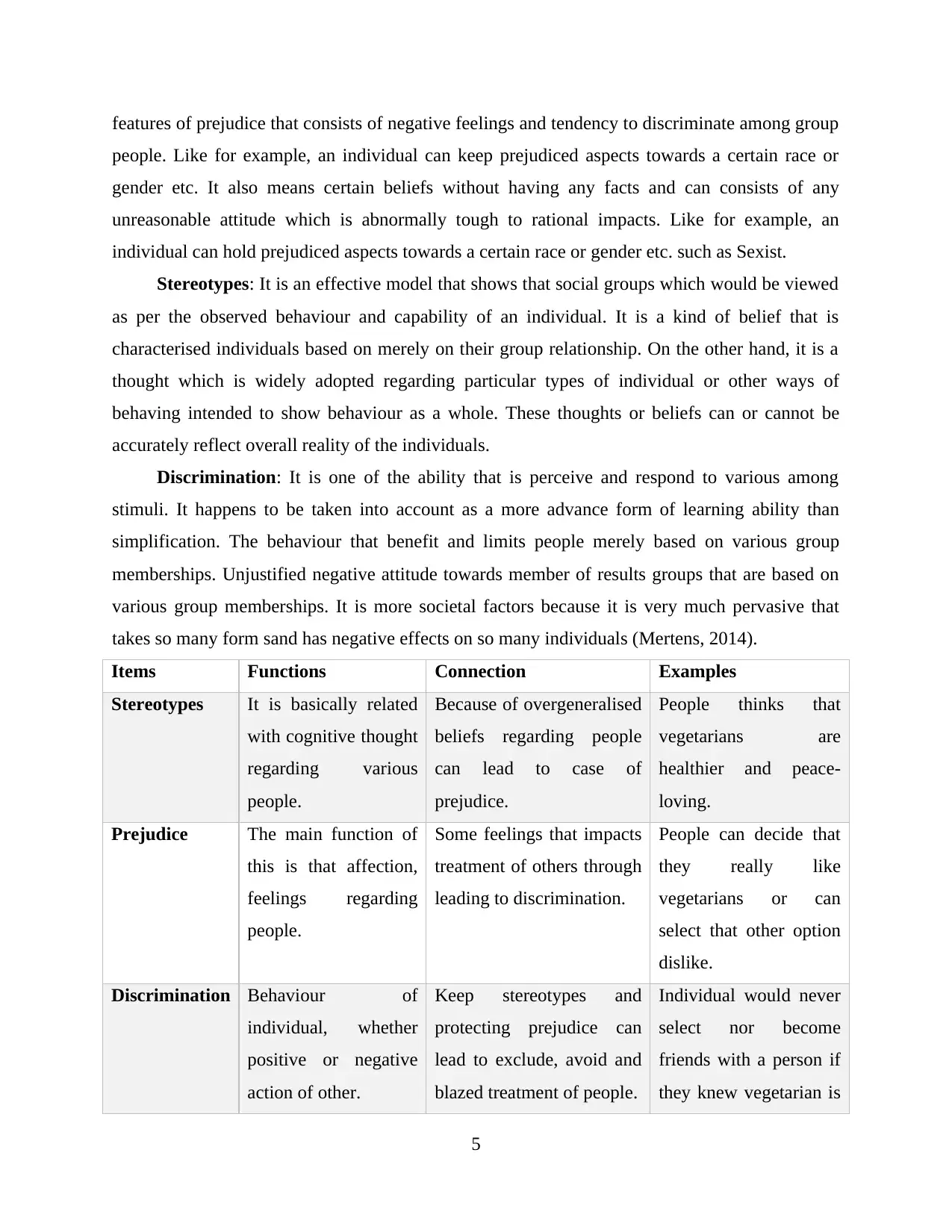
features of prejudice that consists of negative feelings and tendency to discriminate among group
people. Like for example, an individual can keep prejudiced aspects towards a certain race or
gender etc. It also means certain beliefs without having any facts and can consists of any
unreasonable attitude which is abnormally tough to rational impacts. Like for example, an
individual can hold prejudiced aspects towards a certain race or gender etc. such as Sexist.
Stereotypes: It is an effective model that shows that social groups which would be viewed
as per the observed behaviour and capability of an individual. It is a kind of belief that is
characterised individuals based on merely on their group relationship. On the other hand, it is a
thought which is widely adopted regarding particular types of individual or other ways of
behaving intended to show behaviour as a whole. These thoughts or beliefs can or cannot be
accurately reflect overall reality of the individuals.
Discrimination: It is one of the ability that is perceive and respond to various among
stimuli. It happens to be taken into account as a more advance form of learning ability than
simplification. The behaviour that benefit and limits people merely based on various group
memberships. Unjustified negative attitude towards member of results groups that are based on
various group memberships. It is more societal factors because it is very much pervasive that
takes so many form sand has negative effects on so many individuals (Mertens, 2014).
Items Functions Connection Examples
Stereotypes It is basically related
with cognitive thought
regarding various
people.
Because of overgeneralised
beliefs regarding people
can lead to case of
prejudice.
People thinks that
vegetarians are
healthier and peace-
loving.
Prejudice The main function of
this is that affection,
feelings regarding
people.
Some feelings that impacts
treatment of others through
leading to discrimination.
People can decide that
they really like
vegetarians or can
select that other option
dislike.
Discrimination Behaviour of
individual, whether
positive or negative
action of other.
Keep stereotypes and
protecting prejudice can
lead to exclude, avoid and
blazed treatment of people.
Individual would never
select nor become
friends with a person if
they knew vegetarian is
5
people. Like for example, an individual can keep prejudiced aspects towards a certain race or
gender etc. It also means certain beliefs without having any facts and can consists of any
unreasonable attitude which is abnormally tough to rational impacts. Like for example, an
individual can hold prejudiced aspects towards a certain race or gender etc. such as Sexist.
Stereotypes: It is an effective model that shows that social groups which would be viewed
as per the observed behaviour and capability of an individual. It is a kind of belief that is
characterised individuals based on merely on their group relationship. On the other hand, it is a
thought which is widely adopted regarding particular types of individual or other ways of
behaving intended to show behaviour as a whole. These thoughts or beliefs can or cannot be
accurately reflect overall reality of the individuals.
Discrimination: It is one of the ability that is perceive and respond to various among
stimuli. It happens to be taken into account as a more advance form of learning ability than
simplification. The behaviour that benefit and limits people merely based on various group
memberships. Unjustified negative attitude towards member of results groups that are based on
various group memberships. It is more societal factors because it is very much pervasive that
takes so many form sand has negative effects on so many individuals (Mertens, 2014).
Items Functions Connection Examples
Stereotypes It is basically related
with cognitive thought
regarding various
people.
Because of overgeneralised
beliefs regarding people
can lead to case of
prejudice.
People thinks that
vegetarians are
healthier and peace-
loving.
Prejudice The main function of
this is that affection,
feelings regarding
people.
Some feelings that impacts
treatment of others through
leading to discrimination.
People can decide that
they really like
vegetarians or can
select that other option
dislike.
Discrimination Behaviour of
individual, whether
positive or negative
action of other.
Keep stereotypes and
protecting prejudice can
lead to exclude, avoid and
blazed treatment of people.
Individual would never
select nor become
friends with a person if
they knew vegetarian is
5
Paraphrase This Document
Need a fresh take? Get an instant paraphrase of this document with our AI Paraphraser
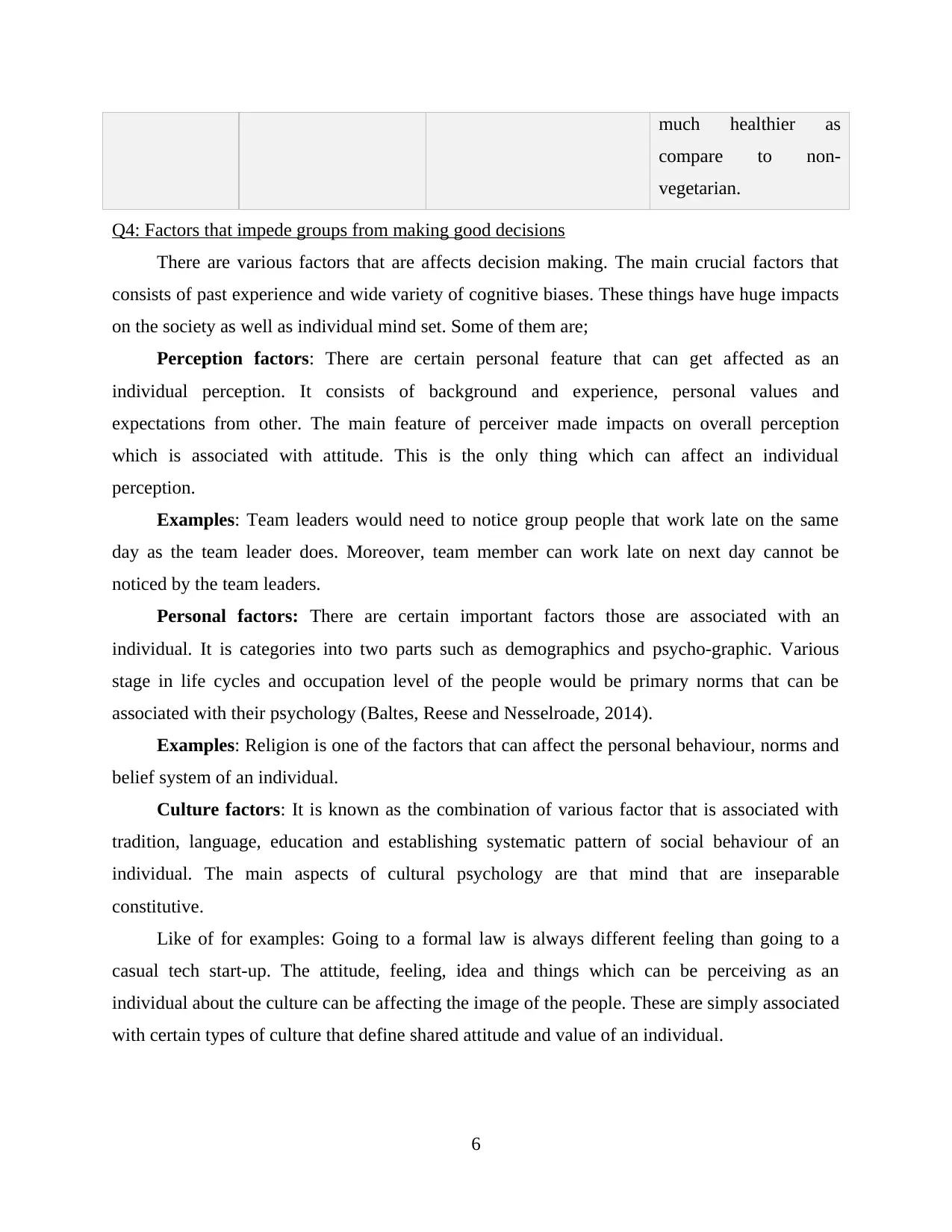
much healthier as
compare to non-
vegetarian.
Q4: Factors that impede groups from making good decisions
There are various factors that are affects decision making. The main crucial factors that
consists of past experience and wide variety of cognitive biases. These things have huge impacts
on the society as well as individual mind set. Some of them are;
Perception factors: There are certain personal feature that can get affected as an
individual perception. It consists of background and experience, personal values and
expectations from other. The main feature of perceiver made impacts on overall perception
which is associated with attitude. This is the only thing which can affect an individual
perception.
Examples: Team leaders would need to notice group people that work late on the same
day as the team leader does. Moreover, team member can work late on next day cannot be
noticed by the team leaders.
Personal factors: There are certain important factors those are associated with an
individual. It is categories into two parts such as demographics and psycho-graphic. Various
stage in life cycles and occupation level of the people would be primary norms that can be
associated with their psychology (Baltes, Reese and Nesselroade, 2014).
Examples: Religion is one of the factors that can affect the personal behaviour, norms and
belief system of an individual.
Culture factors: It is known as the combination of various factor that is associated with
tradition, language, education and establishing systematic pattern of social behaviour of an
individual. The main aspects of cultural psychology are that mind that are inseparable
constitutive.
Like of for examples: Going to a formal law is always different feeling than going to a
casual tech start-up. The attitude, feeling, idea and things which can be perceiving as an
individual about the culture can be affecting the image of the people. These are simply associated
with certain types of culture that define shared attitude and value of an individual.
6
compare to non-
vegetarian.
Q4: Factors that impede groups from making good decisions
There are various factors that are affects decision making. The main crucial factors that
consists of past experience and wide variety of cognitive biases. These things have huge impacts
on the society as well as individual mind set. Some of them are;
Perception factors: There are certain personal feature that can get affected as an
individual perception. It consists of background and experience, personal values and
expectations from other. The main feature of perceiver made impacts on overall perception
which is associated with attitude. This is the only thing which can affect an individual
perception.
Examples: Team leaders would need to notice group people that work late on the same
day as the team leader does. Moreover, team member can work late on next day cannot be
noticed by the team leaders.
Personal factors: There are certain important factors those are associated with an
individual. It is categories into two parts such as demographics and psycho-graphic. Various
stage in life cycles and occupation level of the people would be primary norms that can be
associated with their psychology (Baltes, Reese and Nesselroade, 2014).
Examples: Religion is one of the factors that can affect the personal behaviour, norms and
belief system of an individual.
Culture factors: It is known as the combination of various factor that is associated with
tradition, language, education and establishing systematic pattern of social behaviour of an
individual. The main aspects of cultural psychology are that mind that are inseparable
constitutive.
Like of for examples: Going to a formal law is always different feeling than going to a
casual tech start-up. The attitude, feeling, idea and things which can be perceiving as an
individual about the culture can be affecting the image of the people. These are simply associated
with certain types of culture that define shared attitude and value of an individual.
6
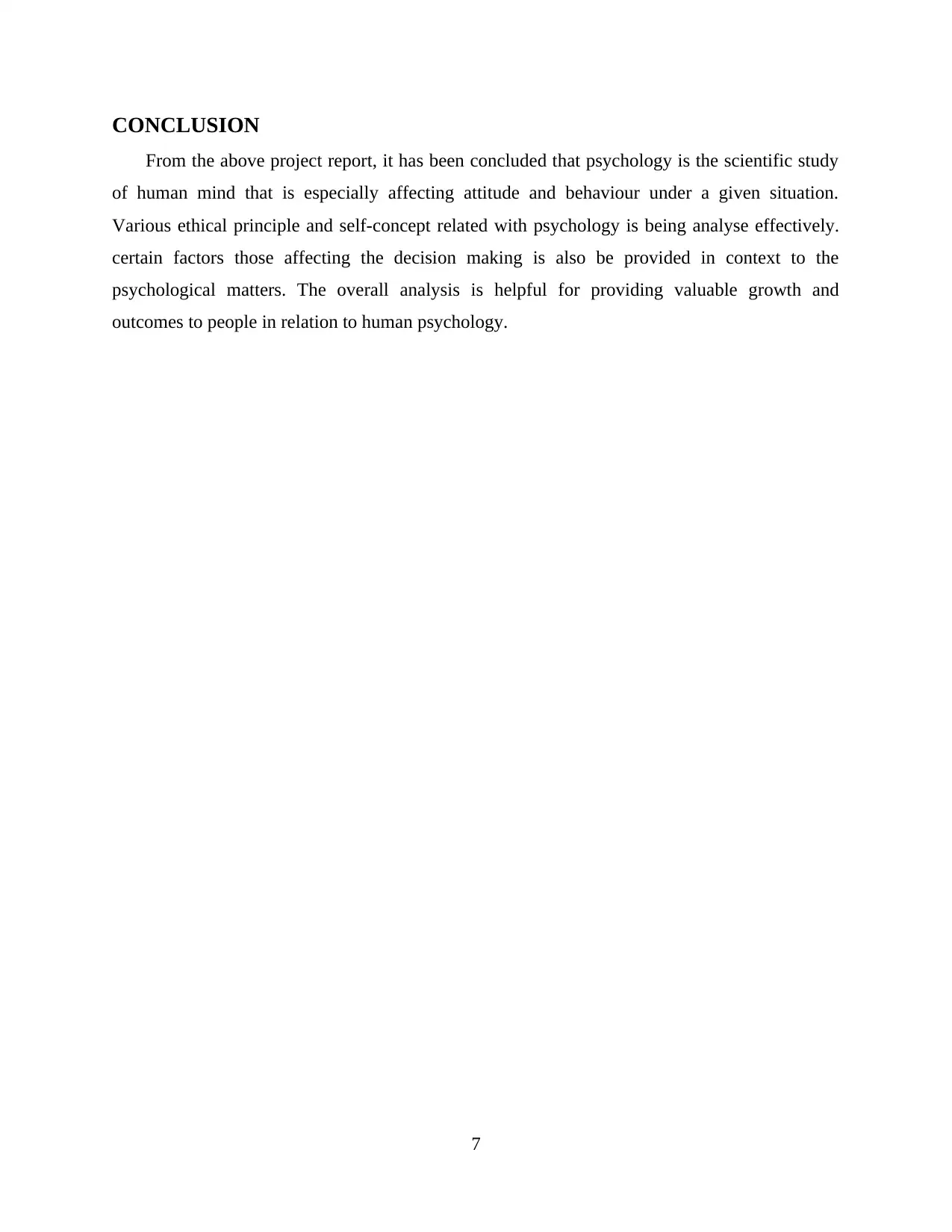
CONCLUSION
From the above project report, it has been concluded that psychology is the scientific study
of human mind that is especially affecting attitude and behaviour under a given situation.
Various ethical principle and self-concept related with psychology is being analyse effectively.
certain factors those affecting the decision making is also be provided in context to the
psychological matters. The overall analysis is helpful for providing valuable growth and
outcomes to people in relation to human psychology.
7
From the above project report, it has been concluded that psychology is the scientific study
of human mind that is especially affecting attitude and behaviour under a given situation.
Various ethical principle and self-concept related with psychology is being analyse effectively.
certain factors those affecting the decision making is also be provided in context to the
psychological matters. The overall analysis is helpful for providing valuable growth and
outcomes to people in relation to human psychology.
7
⊘ This is a preview!⊘
Do you want full access?
Subscribe today to unlock all pages.

Trusted by 1+ million students worldwide
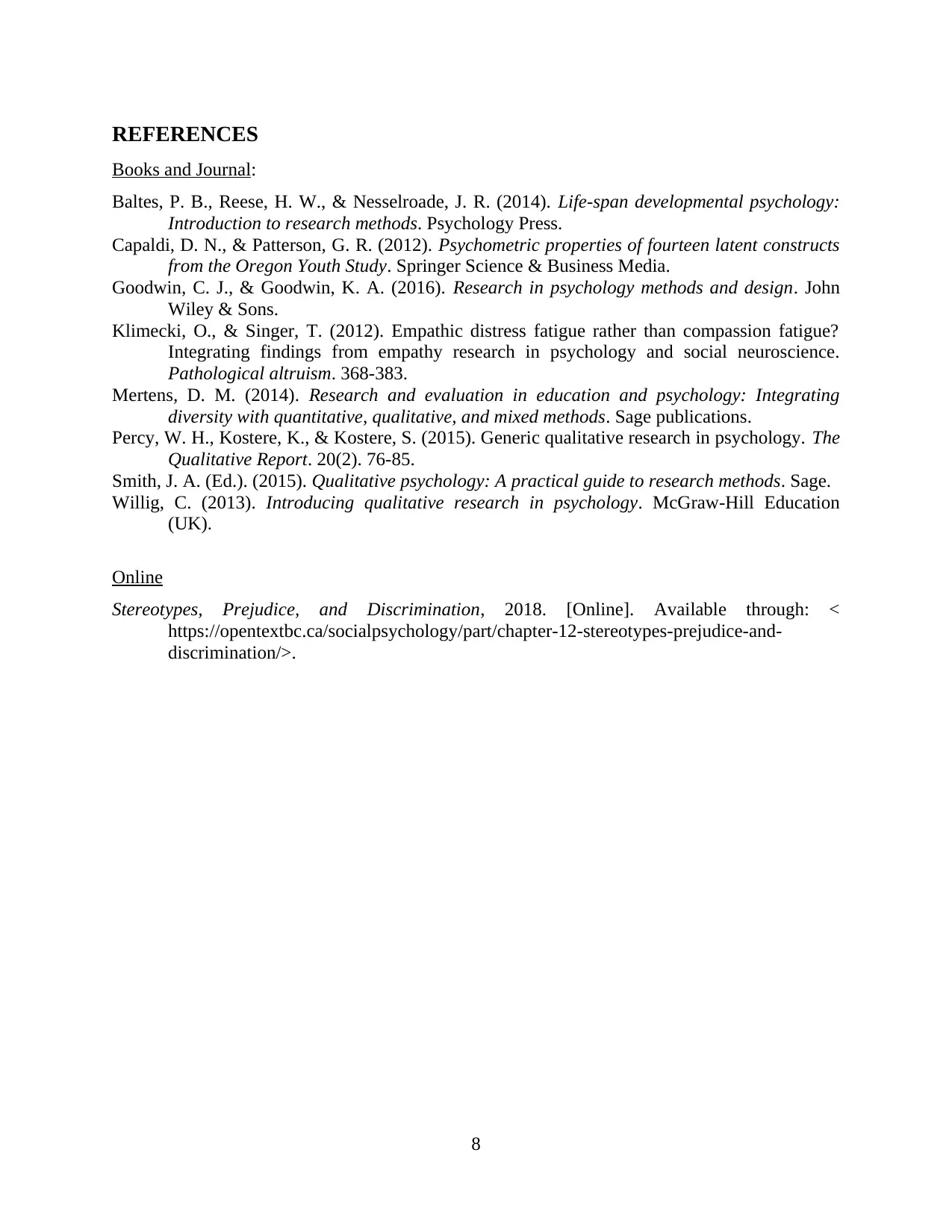
REFERENCES
Books and Journal:
Baltes, P. B., Reese, H. W., & Nesselroade, J. R. (2014). Life-span developmental psychology:
Introduction to research methods. Psychology Press.
Capaldi, D. N., & Patterson, G. R. (2012). Psychometric properties of fourteen latent constructs
from the Oregon Youth Study. Springer Science & Business Media.
Goodwin, C. J., & Goodwin, K. A. (2016). Research in psychology methods and design. John
Wiley & Sons.
Klimecki, O., & Singer, T. (2012). Empathic distress fatigue rather than compassion fatigue?
Integrating findings from empathy research in psychology and social neuroscience.
Pathological altruism. 368-383.
Mertens, D. M. (2014). Research and evaluation in education and psychology: Integrating
diversity with quantitative, qualitative, and mixed methods. Sage publications.
Percy, W. H., Kostere, K., & Kostere, S. (2015). Generic qualitative research in psychology. The
Qualitative Report. 20(2). 76-85.
Smith, J. A. (Ed.). (2015). Qualitative psychology: A practical guide to research methods. Sage.
Willig, C. (2013). Introducing qualitative research in psychology. McGraw-Hill Education
(UK).
Online
Stereotypes, Prejudice, and Discrimination, 2018. [Online]. Available through: <
https://opentextbc.ca/socialpsychology/part/chapter-12-stereotypes-prejudice-and-
discrimination/>.
8
Books and Journal:
Baltes, P. B., Reese, H. W., & Nesselroade, J. R. (2014). Life-span developmental psychology:
Introduction to research methods. Psychology Press.
Capaldi, D. N., & Patterson, G. R. (2012). Psychometric properties of fourteen latent constructs
from the Oregon Youth Study. Springer Science & Business Media.
Goodwin, C. J., & Goodwin, K. A. (2016). Research in psychology methods and design. John
Wiley & Sons.
Klimecki, O., & Singer, T. (2012). Empathic distress fatigue rather than compassion fatigue?
Integrating findings from empathy research in psychology and social neuroscience.
Pathological altruism. 368-383.
Mertens, D. M. (2014). Research and evaluation in education and psychology: Integrating
diversity with quantitative, qualitative, and mixed methods. Sage publications.
Percy, W. H., Kostere, K., & Kostere, S. (2015). Generic qualitative research in psychology. The
Qualitative Report. 20(2). 76-85.
Smith, J. A. (Ed.). (2015). Qualitative psychology: A practical guide to research methods. Sage.
Willig, C. (2013). Introducing qualitative research in psychology. McGraw-Hill Education
(UK).
Online
Stereotypes, Prejudice, and Discrimination, 2018. [Online]. Available through: <
https://opentextbc.ca/socialpsychology/part/chapter-12-stereotypes-prejudice-and-
discrimination/>.
8
1 out of 10
Related Documents
Your All-in-One AI-Powered Toolkit for Academic Success.
+13062052269
info@desklib.com
Available 24*7 on WhatsApp / Email
![[object Object]](/_next/static/media/star-bottom.7253800d.svg)
Unlock your academic potential
Copyright © 2020–2026 A2Z Services. All Rights Reserved. Developed and managed by ZUCOL.




